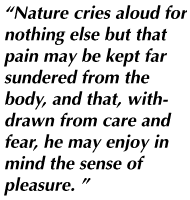It is estimated that every year there are seven million new cases of
cancer worldwide. About one in three people living in the U.S. today - or
85 million Americans - will develop cancer at some point in their lives.
This year alone, nearly two million people living in the United States
will be diagnosed with the disease.
 Clearly, cancer is one of the most challenging diseases facing modem
medicine. Fortunately, medical science has made tremendous progress over
the last 50 years in the treatment of cancer. Survival rates are
increasing across the board for most types of cancer, and new research in
areas like genetics and molecular biology offer great hope for the future.
Clearly, cancer is one of the most challenging diseases facing modem
medicine. Fortunately, medical science has made tremendous progress over
the last 50 years in the treatment of cancer. Survival rates are
increasing across the board for most types of cancer, and new research in
areas like genetics and molecular biology offer great hope for the future.
 Unfortunately, the same kind of dramatic progress has not been seen in
the treatment of the pain caused by cancer. The World Health Organization
estimates that 3.5 million people suffer daily from cancer pain, most of
them needlessly. A recent survey of physicians in Texas conducted by the
Texas Cancer Council indicated that 95% of the doctors who
Unfortunately, the same kind of dramatic progress has not been seen in
the treatment of the pain caused by cancer. The World Health Organization
estimates that 3.5 million people suffer daily from cancer pain, most of
them needlessly. A recent survey of physicians in Texas conducted by the
Texas Cancer Council indicated that 95% of the doctors who
|
 |
responded felt that cancer pain was commonly undertreated.
 The majority of cancer patients experience some pain during the course
of their illness. Some types of cancer, such as leukemia, are relatively
painless. Other types, such as bone cancer, can cause severe pain.
The majority of cancer patients experience some pain during the course
of their illness. Some types of cancer, such as leukemia, are relatively
painless. Other types, such as bone cancer, can cause severe pain.
 Severe pain associated with cancer is often described by the patients as
"unrelenting." Lasting for weeks, months, or years, it can become so
severe and debilitating that patients are unable to work, eat, sleep,
communicate, or think normally. Research has also shown that severe,
untreated pain can suppress the immune system, lead to depression, and
even result in suicide.
Severe pain associated with cancer is often described by the patients as
"unrelenting." Lasting for weeks, months, or years, it can become so
severe and debilitating that patients are unable to work, eat, sleep,
communicate, or think normally. Research has also shown that severe,
untreated pain can suppress the immune system, lead to depression, and
even result in suicide.
 Through education and the proper use of medications that are already
available, cancer patients do not need to suffer from pain caused by the
disease. The tragedy of cancer pain is not that it exists, but that it is
inadequately treated.
Through education and the proper use of medications that are already
available, cancer patients do not need to suffer from pain caused by the
disease. The tragedy of cancer pain is not that it exists, but that it is
inadequately treated.
|
 |


- The Poet,
Lucretius


|


